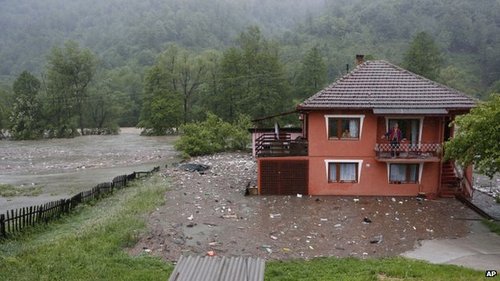
“In September 2012, I spent a day in Odžak, Bosnia, reporting a story for the New Yorker about Balkan Endemic Nephropathy, a mysterious kidney disease that only affects isolated agrarian communities in Bulgaria, Romania, and former Yugoslavia. I was traveling with my father, a nephrologist who used to study this rare disease in the late 1980s, before research was suspended by the war.
The Croatian and Bosnian endemic regions were right next to each other, but everything seemed more difficult in Bosnia. Fewer patients had access to kidney transplants. Medical equipment was a bit older. Research was impeded by more bureaucratic obstacles. The nephrologist at the Odžak hospital didn’t speak English, but had hired a translator for the day: Željko Paradžik, a young law graduate from the village of Prud. We spent the afternoon touring the endemic villages together, interviewing patients and their families, and tramping around the cornfields and wetlands, looking for poisonous weeds. Željko was so helpful and conscientious that I put him in touch with the photographer I was working with, and they later toured the region together. They even made a stop at a Bosnian monastery, where I had heard that the monks might have death records with information about the disease. Željko talked his way into the monastery so that the photographer could take a few shots of the death records, before the monks kicked them out.
Last Tuesday, I woke up to find an email from Željko about the devastation of his village, Prud, by the worst flooding in decades. (All the Balkan nephropathy regions are prone to flooding, and floods may contribute to causing the disease.) He told me that the whole region we had visited together was under water, that he had lost his home, that his three cats were trapped in the attic, and that he was planning a “rescue mission.” In the subsequent days, newspapers have carried reports of “tons of animal carcasses” stagnating in the water, and of twenty-year-old landmines dislodged by the floods. There have also been reports of unexpected solidarity among the region’s once embattled peoples—of Montenegro and Macedonia sending money, volunteers, and diving and medical teams; of the Serbian tennis champion Novak Djokovic donating the prize money from the Rome Masters and raising funds for Bosnia and Croatia, as well as for Serbia. It’s good to know that, even when history seems to be running in a loop, things don’t always happen exactly the same way. In a certain sense, it’s better to lose your home in a flood, than in a fire set by your neighbor. But, in another sense, it isn’t really all that different.
Over the past week, in the downtime...
You have reached your article limit
Sign up for a digital subscription and continue reading all new issues, plus our entire archives, for just $1.50/month.
Already a subscriber? Sign in




